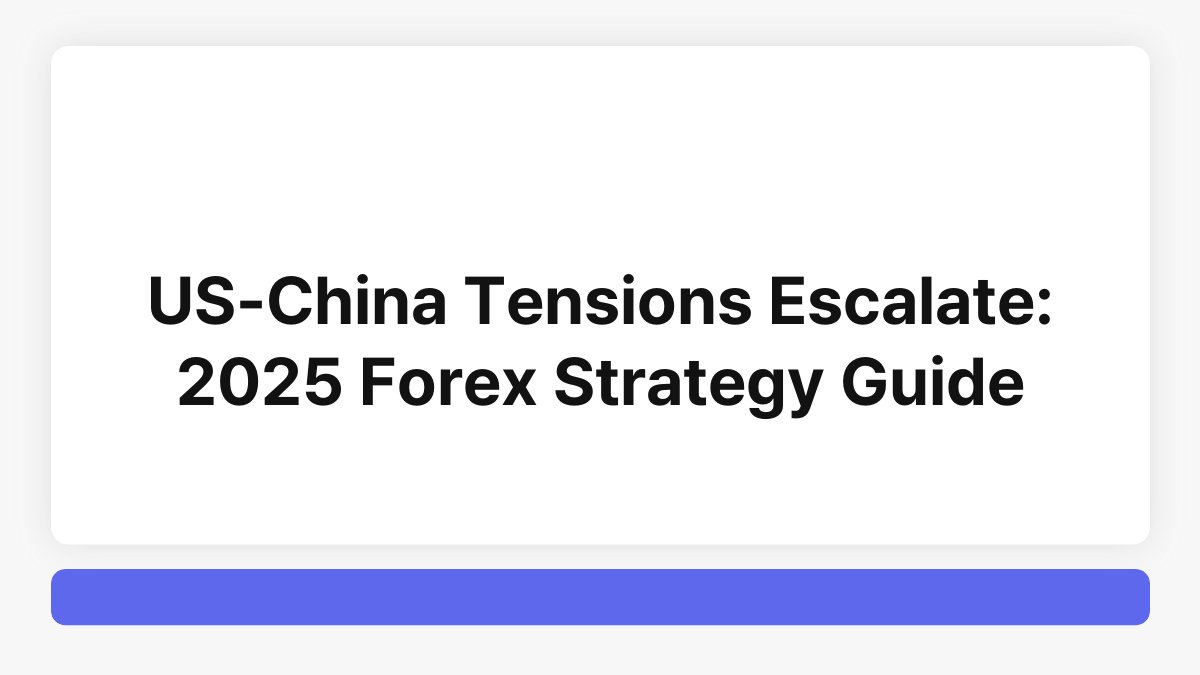[K-Bridge/Samuel] US-China Tensions Escalate: 2025 Forex Strategy Guide is a comprehensive analysis of the increasing geopolitical and economic tensions between the United States and China, particularly as they relate to foreign exchange (forex) markets.
As these tensions escalate, they create significant implications for global trade and investment strategies.
This guide aims to equip traders and investors with the necessary insights and strategies to navigate the complexities of the forex market in 2025. By understanding the underlying factors driving these tensions, readers will be better prepared to make informed decisions in an increasingly volatile environment.
This article will help you grasp the current state of US-China relations, the potential impact on forex markets, and strategic approaches to mitigate risks.
Understanding the US-China Tensions Escalate
Historical Context of US-China Relations
The relationship between the United States and China has always been complex, shaped by historical events, economic interdependence, and ideological differences.
The late 20th century saw a significant shift as China opened its markets, leading to increased trade between the two nations.
However, this relationship has been marred by various conflicts, including trade disputes, human rights issues, and territorial disagreements in the South China Sea.
The culmination of these factors has contributed to a growing sense of rivalry, particularly in the wake of China’s rapid economic growth and its ambition to become a global superpower.
In recent years, the US has adopted a more confrontational stance, imposing tariffs on Chinese goods and restricting technology transfers.
This has led to a tit-for-tat escalation, where both nations have sought to assert their dominance on the global stage.
The trade war has not only affected bilateral trade but has also reverberated through global supply chains, impacting economies worldwide.
Understanding this historical context is crucial for grasping the current dynamics of US-China relations and their implications for forex markets.
Economic Implications of Escalating Tensions
The ongoing tensions between the US and China have profound economic implications that extend beyond the borders of these two nations.
As both countries engage in competitive devaluations and protective trade policies, the forex market experiences heightened volatility.
Currency fluctuations can significantly impact international trade, investment decisions, and overall market stability.
Investors must remain vigilant to the shifts in currency values driven by geopolitical developments.
Moreover, these tensions have led to increased uncertainty in global markets, prompting investors to seek safe-haven currencies such as the US dollar and Swiss franc.
This behavior can exacerbate currency volatility, creating opportunities for savvy traders to capitalize on price movements.
Understanding the economic implications of US-China tensions is essential for developing effective forex strategies that can withstand market fluctuations.
The Role of Technology in US-China Relations
Technology has become a battleground in the escalating tensions between the US and China.
The race for technological supremacy has intensified, with both nations vying for leadership in critical sectors such as artificial intelligence, 5G telecommunications, and cybersecurity.
The US has implemented measures to restrict Chinese companies from accessing advanced technologies, citing national security concerns.
This has led to retaliatory actions from China, further straining relations.
The technological rivalry not only affects bilateral trade but also has significant implications for global supply chains.
Companies reliant on technology from either nation must navigate the complexities of regulatory changes and potential disruptions.
As the situation evolves, traders must remain informed about technological developments and their potential impact on currency values and market sentiment.
Key Factors Influencing Forex Strategies in 2025
Geopolitical Events and Market Reactions
Geopolitical events play a crucial role in shaping forex markets, particularly in the context of US-China tensions.
As political developments unfold, traders must be prepared for swift market reactions.
For instance, announcements regarding tariffs, trade agreements, or military exercises can lead to sudden fluctuations in currency values.
Understanding the geopolitical landscape is essential for developing a proactive forex strategy that anticipates potential market movements.
Traders should closely monitor news cycles and geopolitical developments to identify trends that may impact currency pairs.
This includes keeping an eye on economic indicators, government statements, and international relations.
By staying informed, traders can position themselves to take advantage of market volatility and make informed decisions based on real-time information.
Economic Indicators and Their Impact
Economic indicators serve as vital tools for forex traders seeking to understand market dynamics.
Key indicators such as GDP growth, inflation rates, and employment figures provide insights into the health of economies and can influence currency values.
In the context of escalating US-China tensions, traders must pay particular attention to how these indicators are affected by geopolitical developments.
For instance, a slowdown in economic growth in either country could lead to a depreciation of their respective currencies.
Conversely, positive economic data may bolster confidence and strengthen currency values.
By analyzing economic indicators in conjunction with geopolitical events, traders can gain a more comprehensive understanding of market trends and make informed trading decisions.
Central Bank Policies and Currency Valuation
Central bank policies play a pivotal role in determining currency valuation, especially in times of geopolitical tension.
The Federal Reserve and the People’s Bank of China have significant influence over their respective currencies through interest rate decisions and monetary policy measures.
As tensions escalate, central banks may adopt different strategies to stabilize their economies and currencies.
Traders should closely monitor central bank announcements and policy shifts that may impact currency values.
For instance, a change in interest rates or a new monetary policy framework can lead to immediate reactions in the forex market.
Understanding the motivations behind central bank decisions is crucial for developing effective trading strategies that align with market expectations.
Developing a Forex Strategy Amidst Tensions
Risk Management Techniques
In an environment marked by escalating US-China tensions, effective risk management becomes paramount for forex traders.
The volatility associated with geopolitical events can lead to significant losses if not properly managed.
Traders should employ risk management techniques such as setting stop-loss orders, diversifying their portfolios, and limiting exposure to high-risk currency pairs.
Establishing a clear risk tolerance and adhering to it is essential for long-term success in the forex market.
Traders must assess their individual financial situations and determine how much risk they are willing to take on.
By implementing risk management strategies, traders can protect their capital and navigate the uncertainties posed by geopolitical tensions.
Technical Analysis and Market Trends
Technical analysis serves as a valuable tool for forex traders seeking to identify market trends and potential entry and exit points.
By analyzing historical price patterns and chart indicators, traders can gain insights into future price movements.
In the context of US-China tensions, technical analysis can help traders identify key support and resistance levels that may influence currency values.
Traders should also consider incorporating various technical indicators, such as moving averages and relative strength index (RSI), to enhance their analysis.
By combining technical analysis with an understanding of geopolitical events, traders can develop a more comprehensive trading strategy that accounts for both historical price trends and current market dynamics.
Fundamental Analysis and Currency Valuation
Fundamental analysis focuses on evaluating the intrinsic value of currencies based on economic, political, and social factors.
In an environment of escalating US-China tensions, fundamental analysis becomes increasingly important for forex traders.
By assessing economic indicators, central bank policies, and geopolitical developments, traders can gain insights into currency valuation and make informed trading decisions.
Traders should pay close attention to economic reports and geopolitical news that may impact currency values.
Understanding the broader economic context and its implications for currency valuation can help traders identify potential trading opportunities.
By combining fundamental analysis with technical analysis, traders can develop a well-rounded forex strategy that adapts to changing market conditions.
Conclusion
The escalating tensions between the US and China present both challenges and opportunities for forex traders in 2025. By understanding the historical context, economic implications, and key factors influencing forex strategies, traders can navigate the complexities of the market with greater confidence.
Effective risk management, technical analysis, and fundamental analysis are essential components of a successful trading strategy in this dynamic environment.
As the geopolitical landscape continues to evolve, staying informed and adaptable will be crucial for traders seeking to thrive amidst uncertainty.








